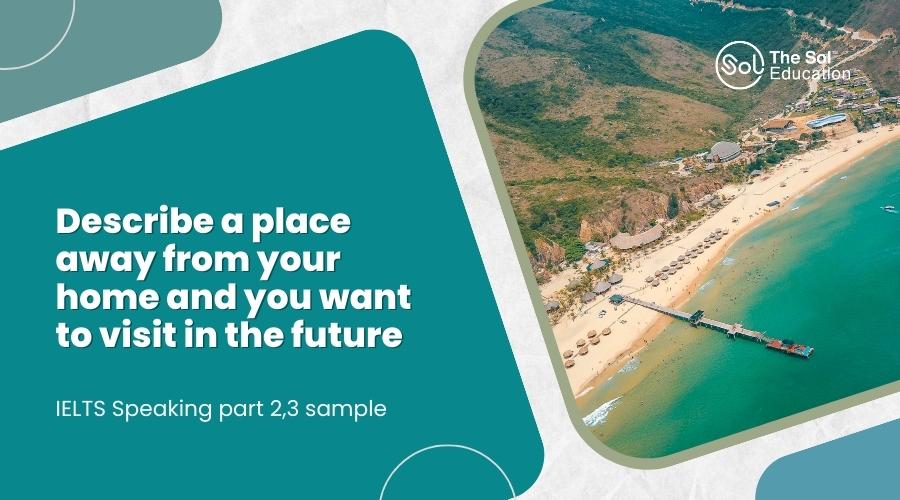Câu trả lời tham khảo cho phần thi IELTS Speaking part 2 và IELTS Speaking part 3 topic Describe a place away from your home and you want to visit in the future từ The SOL Education.
Describe a place away from your home and you want to visit in the future
You should say:
One place that I am eager to visit in the future is Quy Nhơn, a beautiful coastal city located in the central region of my country. There are several reasons why I have a strong desire to explore this enchanting destination.
First and foremost, I have heard numerous captivating stories from friends and acquaintances who have had the pleasure of visiting Quy Nhơn. They often describe it as a picturesque city with stunning beaches that stretch throughout the urban area. The idea of walking along the pristine shores, feeling the soft sand beneath my feet, and enjoying the soothing sound of the waves is incredibly appealing to me. The natural beauty of Quy Nhơn, with its crystal-clear waters and lush landscapes, is something I yearn to experience.
Additionally, one of the most enticing aspects of Quy Nhơn is its culinary scene. I have been told that the local cuisine is not only delicious but also incredibly affordable. The prospect of indulging in mouthwatering dishes like "bánh xèo," "bánh hỏi," and a wide variety of fresh seafood is a culinary adventure I cannot wait to embark on. Exploring the local markets and trying authentic Vietnamese dishes prepared by skilled chefs is a dream come true for any food lover like me.
As for the timing of my visit, I am planning to journey to Quy Nhơn in July of next year. I believe this timing will provide the perfect opportunity for a memorable trip as the weather is typically warm and pleasant during that period. The gentle breeze and clear skies will make the beach experience even more enjoyable.
Moreover, I intend to bring my parents along on this excursion. They have never had the chance to travel far from home, and I believe that a trip to Quy Nhơn would be a fantastic opportunity for them to explore a new place and create lasting memories together. Witnessing their excitement and joy as they discover the beauty of Quy Nhơn will undoubtedly be a heartwarming experience for me.

People often choose a variety of destinations for their holidays. Some prefer to travel internationally, exploring new countries and experiencing different cultures. Others may opt for domestic travel, visiting tourist attractions within their own country. The choice of destination can depend on factors like personal interests, budget, and the desire for adventure or relaxation.
Staying at home on holidays can be enjoyable for several reasons. Some people find comfort and relaxation in their familiar surroundings. They may use the time to rest, catch up on hobbies, or spend quality time with family and friends. Additionally, staying at home can be more budget-friendly, and it eliminates the stress and hassles associated with travel, such as packing, transportation, and accommodation.
Students who have taken a gap year differ from their peers in several ways. Gap year students typically take a break from formal education to engage in experiences like travel, volunteering, or internships. As a result, they often have a broader perspective, increased maturity, and a deeper understanding of themselves and the world. They may also bring practical skills and real-world experience to their studies when they return to formal education.
Teenagers' travel preferences can vary. Some teenagers prefer to travel with friends as it provides them with companionship and shared experiences. Others may choose to travel alone, seeking independence and the opportunity for self-discovery. The choice often depends on the teenager's personality, destination, and the purpose of the trip.
The most desirable place for people to visit during the holiday is subjective and can vary greatly from person to person. Some may prefer natural destinations like beaches, mountains, or national parks for relaxation and outdoor activities. Others may be interested in cultural destinations, historical sites, or vibrant cities to explore local traditions and attractions. Ultimately, the most desirable place depends on individual interests and the type of experiences people seek during their holidays.
Tourism and cultural exchange are closely linked. When people travel to different regions or countries, they have the opportunity to immerse themselves in new cultures, interact with local communities, and learn about traditions, customs, and languages different from their own. Tourism promotes cross-cultural understanding, tolerance, and appreciation. It allows for the sharing of knowledge and experiences between tourists and the host community, fostering cultural exchange and mutual enrichment.
Hy vọng bài viết sẽ cung cấp cho bạn các từ vựng hữu ích cũng như ý tưởng để trả lời các câu hỏi IELTS Speaking.
Chúc các bạn học tốt.
Đọc thêm:
